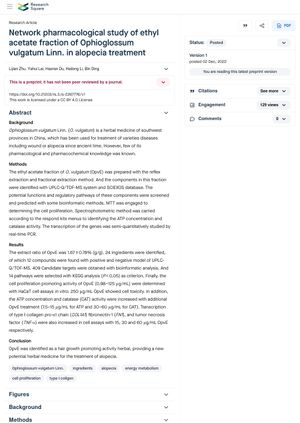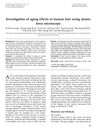Network Pharmacological Study of Ethyl Acetate Fraction of Ophioglossum Vulgatum Linn. in Alopecia Treatment
December 2022
in “
Research Square (Research Square)
”

TLDR The ethyl acetate fraction of Ophioglossum vulgatum Linn. may promote hair growth and could be a new herbal treatment for hair loss.
The ethyl acetate fraction of Ophioglossum vulgatum Linn. (OpvE), a traditional Chinese herbal medicine, was studied for its potential in treating alopecia. The extract ratio of OpvE was 1.67 ± 0.78% (g/g) and 24 ingredients were identified. Bioinformatic analysis revealed 409 candidate targets and 14 pathways were selected with KEGG analysis. The study found that OpvE promoted cell proliferation in HaCaT cell assays in vitro, with concentrations of 0.98–125 µg/mL. However, a concentration of 250 µg/mL showed cell toxicity. Additionally, ATP concentration and catalase (CAT) activity increased with additional OpvE treatment (7.5–15 µg/mL for ATP and 30–60 µg/mL for CAT). Transcription of type Ⅰ collagen pro-α1 chain (COL1A1), fibronectin-1 (FN1), and tumor necrosis factor (TNF-α) also increased in cell assays with 15, 30, and 60 µg/mL OpvE respectively. The study concluded that OpvE has hair growth promoting activity, offering a new potential herbal treatment for alopecia.






